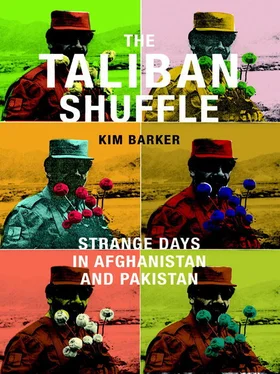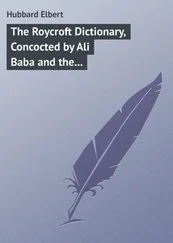The gunners complied, ducking down as we passed through the circle. Someone in our Humvee put on the singer George Thorogood, music to get macho to. We drove past fruit markets and Afghans on motorcycles. One nearly fell over in its attempt to get away.
“A white Toyota station wagon with Toyota written in the windshield,” the first lieutenant said, looking out the window. “That’s nice. I feel safe.”
We drove past a donkey, past a dozen white Toyota Corollas, past Soilstone Laboratory, past the beige huts on the outskirts of Kabul, toward our destination: Collection of Boys.
“It’s like fourth world here,” said the gunner, surveying the bleak countryside. “Dirt walls, blankets for doors. That guy’s got one shoe, he’s saving up for a second shoe.”
The song “Bad to the Bone” came on. The gunner tapped his boot. Within the hour, we pulled up to the police station at Mir Bacha Kot. Two Afghan officers guarded the road into the parking lot. Neither had a weapon or gloves. One had the wrong boots. The American soldiers first took an inventory of the weapons to make sure none had been sold. They had already seen the corruption here—in another district, U.S. military discretionary money had bought a powerful generator for the police station. The district governor then took the generator to his house.
In the parking lot, basically a pile of rocks, the Americans then lined up fourteen Afghan officers. With all their equipment, the Americans looked like superheroes. The Afghans looked pathetic. Six did not have weapons because they were not qualified to have weapons. Of the other eight, only three said they had been to the main police-training center. And one was probably mistaken; he grinned wildly and raised his hand to every question.
The Afghans mimicked the Americans raising their weapons. The Americans ducked.
“They’ve had training, right?” one soldier asked. “They could have shot everyone.”
The police officers without weapons aimed their fingers and laughed hysterically. They leaned back as they pointed their guns and fingers. A U.S. soldier started going apoplectic because an Afghan soldier wouldn’t bend his knees. Another police officer stuck his rifle butt between his knees, pointed the weapon at his head, and started yanking on something inside his empty cartridge.
“Tell him, never stick his hand in his weapon,” a U.S. soldier said. He turned away and muttered, “Takes every fiber of my being.”
One Afghan officer jumped over razor wire, his finger on the trigger. Another, finger also on the trigger, leaned on his loaded weapon, muzzle on his boot—in years past, I knew of at least one Afghan police officer, nicknamed “Crazy Eyes” by U.S. soldiers, who had shot a hole in his foot that way. On a walk through the village, an Afghan police officer waved his gun at a baby. Another held his gun upside down with his finger in the trigger loop.
At one point I had to turn around, I was laughing so hard. The photographer was laughing.
“These guys are the best Afghanistan has to offer?” he asked.
“The Afghan police make me laugh,” I admitted.
Probably not the best attitude, but it was true. I also kept a video of the Afghan army trying to do jumping jacks, which resembled a really bad dance or an incurable disease. I often showed the video to Americans who thought we could train the Afghans quickly to take care of their own security and then get out. The Illinois soldiers would visit this police station once every few weeks for a couple of hours at a time. And then, in another nine months, they would leave.
The soldiers gave the police some concertina wire—apparently, they had done a good job—before heading back to Kabul, listening to Metallica’s “Ride the Lightning.” At a debriefing back at Camp Phoenix, some of the Illinois soldiers were frustrated. Training was inconsistent; none of the fifteen rolls of razor wire donated the last trip had been used; new AK-47s were still in boxes; all the police demanded flashlights. The police officers had to share the district’s only pen, that is, the ones who could write.
“What struck me is how these guys are supposed to be trained,” one soldier said. “Are you kidding me? These motherfuckers can’t even pivot. Don’t they all have jobs to do? I know at the last police department, we asked them, ‘Do you ever arrest anybody?’ ‘No.’ ‘What do you do?’ They’re like, ‘Eating, sleeping, nothing.’ I mean, what are they policing? This is another brick wall we’re running into. They aren’t doing anything.”
Everyone griped. Then the first lieutenant made a proposal.
“I was able to talk to the chief. He wanted to take one kilometer of wire up to the cell-phone tower. Then they can have twenty-four-hour electricity.”
Everyone looked at him, silent.
“You can’t do that,” the DynCorp guy finally said. “We’re trying to teach them about corruption. You can’t help them steal power.”
The first lieutenant was unrepentant. “It makes sense. It’s an easy thing we can do that will really help them.”
“You can’t be serious,” the DynCorp guy said.
He was. Quick fixes, fast turnarounds, an easy bang for the buck. That pretty much typified the international approach. But the only thing that would make a difference with the Afghan police was a whole lot of training, for a whole lot of years, with a whole lot of money. This was a largely illiterate country wracked by thirty years of war, a place where young men from the provinces didn’t know how to lace their boots because they’d never had boots. It’s not like Afghans couldn’t fight—of course they could. But the only recruits willing to earn so little money to be cannon fodder were not the best and the brightest. Mostly, they were the no-hopes.
While on this embed, I wrote at least one good story for the Tribune about local soldiers helping in a foreign land. But I also wrote a few embarrassing clunkers to appeal to my new bosses, including one about the delivery of Chicago-style pizza to the soldiers, just in time for Super Bowl Sunday. The last time I had written anything that so reeked of jingoism and free advertising, I had just entered puberty. Even so, I got mocked by colleagues at the Associated Press and was sent a piece of hate mail because I quoted a soldier who criticized the pizza. I could not win.
Starved for the relative normalcy of Kabul, I soon left the soldiers. A friend who worked as a UN adviser to the Afghan-run Independent Electoral Commission came to town. Over lunch, he described the election fraud he had witnessed in the southeast. Already Afghans were registering to vote for the upcoming presidential election. But my friend had caught Afghan election workers creating thousands of fake registration cards. Women had also registered in unprecedented numbers in the conservative southeast—numbers that were likely inflated. In one province, when asked about registration, a top election official bragged that his province not only was registering a lot of women but was also registering children. My friend reported the suspected fraud; his UN superiors said they would send a committee to investigate but never did. I was not entirely surprised. The previous fall, Karzai had named loyalists to run three ministries—Interior, Education, and Tribal Affairs. Interior ran the police. Education ran the teachers. Both ministries had people everywhere. Tribal Affairs worked with the tribes, crucial to any election. By that point, the fix was in. UN officials and Western diplomats started distancing themselves from the election, referring to it as “an Afghan process” and “Afghan-led.” It wasn’t too difficult to decipher their meaning—they were absolving themselves of any responsibility, even as the UN put its hat out to raise more than $300 million to foot the bill.
Читать дальше











